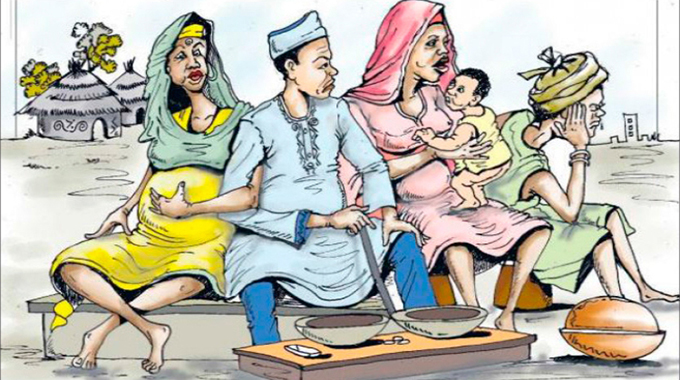Watering a thorn for the sake of the rose
BACK in the village in the land of milk, honey and dust or Guruve — if you like — elders say send a boy where he wants to go and you will see his best pace.
In the village a daily dose of proverbs makes a fellow wiser, richer and more refined than others without it and is far much better than silver and gold.
Ignorance, the autochthons say, is not a disease but something worse than a disease, yet good conscience is a soft pillow, you can rest on it.
Jaricha was resettled under the land reform programme at Dande Farm, and there he started producing tobacco, also known as the golden leaf, with workers he never really cared to pay, broke nor not.
An empty purse normally frightens away friends but conversely, every misfortune is a blessing. His workers were the kind that would water a thorn for the sake of the rose.
Dawn’s glow was at its maximum intensity but as the day became brighter and brighter, the silhouette colours began to fade.
The sun crawled from below the horizon, its first rays painting the weathered landscape into a brownish hue.
The groaning and grunting tractor engine drowned the otherwise melodious singing and chirping of the birds as they routinely welcomed the new day. One farm worker after another climbed up the flatbed trailer, taking a seat on the space left.
Men and women sat, most of them allowing their legs to dangle precariously where the drop-side trailer bars should have been.
With no protective clothing and in mostly tattered and torn clothes, some of them mere former clothes now an array of strings loosely held together with knots, the farm workers were a resilient lot.
Everyday they woke up early and religiously caught up with the 5am time that the tractor left the compound for the tobacco fields.
Everyday the workers never complained about working late. Everyday they never complained about not being paid. They were “patriotic.”
At times, they finished at 7pm but they never complained. Never!
No pay, but no complaining. Actually, they loved finishing late. Jaricha eventually got worried about their not complaining.
The workers had their common proverb which Jaricha never cared to understand. “Golden leaf, produces real gold! A son of the soil waters a thorn to get the rose!” This became some secret code for the workers.
Jaricha only got to the fields here and there, standing and shouting instructions from the verges. The workers would hear the sound of his motorbike as he came and put their act together.
He always found them working. The foreman, Kajawo, was very popular with the workers. He wondered why they loved him so much. There was a lot of speculation, about the foreman.
One story line in Jaricha’s house was that Kajawo bedded many women in return for giving them small portions to work on or less arduous tasks.
The other school of thought was that Kajawo was a magician, more feared than loved. The love for him was fake.
It was all speculative. But work was still done on time and well too.
So, in the final analysis, Kajawo was a good foreman.
On many occasions workers refused to finish early preferring to work into dusk. It was inexplicable.
During weekends, especially after the Saturday half-day, the workers became a different crop of people.
Suddenly they would become flamboyant, drinking at the farm beerhall with much spending power. The farm owner Jaricha, was really amazed by their buying power.
After all, people who are not paid still had money to buy beer and make merry. The compound was awash with stories of spouse-snatching after beer drinking binges. There was betting too.
Parties were thrown around.
One day, Jaricha chose a vantage point near the beerhall.
Most of the men and women were drunken silly and carefree. Some naughty men beat and fondled drunken women’s generous behinds, without the women complaining.
Such is compound life. Everyone seemed more monied for farm workers who have gone for months on end without wages.
Phiri, one of the workers, always developed a loose mouth when drunk. While trying to relieve himself behind a compound grass thatch wall, he bumped into Jaricha.
Old, wiry, hairy, skinny and with a forehead and temple wired up with a network of interlocking veins, Phiri, walked with a staggering gait.
It was worse when he was drunk.
All his energy, strength, humility, ego, vision, effort, dignity, image and everything had been spent on this farm, from the days it was owned by the white man to now.
He was certainly in the sunset of his life, he cared not much, though.
There was really nothing left for him.
He had not worked anywhere else but this farm.
He looked straight into the face of Jaricha and with no sign of respect. It was a drunken look, complete with bleary, bloody eyes.
“Wha-a-a-at dhu yuuu wha-a-ant pano? Yuuu dhont peyi us but we get ghorodhi furomu yo-o firidzi and sero, every day. Tirikudya mari yedu yeghorodhi, iwe uchadya ghorodheni rifi rako”, said Phiri as he turned away, pulled his fly up and spat at least once.
On further investigations Jaricha learnt that there had been discovery of gold in his fields and that the workers actually picked up nuggets of gold while they weeded.
In fact, there was a buyer who always came into the compound at night.
The workers were least worried about salary.
When he stopped the workers from picking the gold everyone resigned.
Suddenly there was no labour force.
Of course, by that time, there was little gold left. It was hidden somewhere in the compound.
Poor Jaricha!







Comments